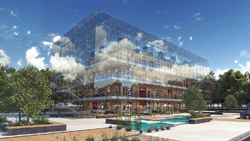Nation’s First Virtual Care Center

By Mercy’s Laura Keep
Imagine a new kind of doctor’s office, one where a patient receives lifesaving care without ever stepping foot inside the building. Mercy this week announced plans for the nation’s first virtual care center to be located on 38 acres at Highway 40 and Clarkson Road near Mercy’s headquarters in Chesterfield, Mo.
The $90 million center is expected to open in 2 ½ years and will be staffed by hundreds of doctors and nurses linked electronically to Mercy hospitals, clinics and even patient homes via telemedicine technology. Mercy serves more than 3 million patients a year through its 30 hospitals and more than 200 outpatient facilities in Arkansas, Kansas, Missouri and Oklahoma.
“Mercy is very much about face-to-face care with a warm human touch, and these important elements will always remain key to how we practice medicine,” said Dr. Tom Hale, executive medical director of Mercy’s Center for Innovative Care, which is driving the development of the virtual care center. “This center is not an alternative to how we care for our patients; rather it further extends specialized health care services to all of our Mercy communities.”
In addition, Mercy is investing $590 million in technology to get the virtual care center online.
The virtual care center will be home to a number of telehealth projects still in the planning stages. It will also bring together Mercy’s existing telemedicine programs under one roof.
For example, the Mercy SafeWatch program is currently the largest electronic intensive care unit (ICU) in the country. Doctors monitor more than 400 beds at 10 hospitals across the four-state area from a St. Louis hub. SafeWatch uses in-room cameras and audio connections so specialists and ICU nurses can provide around-the-clock support to the patients’ doctors and nurses at the bedside.
In addition, some Mercy emergency rooms already feature the telestroke program. Patients who come to the ER with symptoms of a stroke can be seen immediately by not only an emergency room doctor but a neurologist. Neurologists are on call 24/7 and immediately available via a telemedicine connection to help diagnose the patient and order lifesaving stroke medication if necessary.
“Many community ERs across the country don’t have a neurologist on hand,” said Dr. Hale. “Ultimately, that means stroke patients can’t get the critical care they need when the clock starts ticking.” For patients, it’s the difference between life and death.
For 55-year-old David Richardson, who lives in Fountain Lake, Ark., Mercy’s telestroke technology likely saved his life. The navy veteran recently slumped over at his kitchen table after suffering a stroke. By the time the ambulance arrived at Mercy’s hospital in Hot Springs, a live-remote NeuroCall neurologist based at a hub in Florida was already on the screen assessing the situation. Within minutes, the neurologist determined a clot-busting drug must be administered and it was.
By the time Richardson reached the intensive care unit, he was talking. In two days, he was walking. And in less than two weeks, he was able to go home.
Other programs envisioned at the virtual care center include:
Teleradiology – 24/7 remote radiology medical team available to minimize turnaround times for patients and maximize productivity of radiology groupsTelepathology – 24/7 remote pathology medical team available to all Mercy facilities to quickly provide general and specific diagnostic servicesPrimary care support – specialty physicians standing by to provide patients in rural areas faster, more efficient access to care via telemedicineNurse on-call – nurses ready to help patients decide the most appropriate care via phone or emailRemote disease management – patients will be connected to the center via home-based technologies to monitor weight, blood pressure, blood glucose, EKGs and more. The results will download directly into the patient’s electronic health record.
“The virtual care center is a tremendously exciting change in the delivery of health care,” said Lynn Britton, president and CEO of Mercy. “Whether our patients live in urban or rural communities, they’ll be able to benefit from the expertise of specialists and receive exceptional care with dramatically improved turnaround times.”
Mercy bought 24 acres at the location five years ago for $21 million from Tri-Star Properties. Mercy is in the process of purchasing a contiguous, 14-acre plot from Sachs Properties for $31 million. The new structure will be located just east of Chesterfield Mall, about seven miles west of Mercy Hospital in Creve Coeur.
McCarthy Building Cos. is the contractor with Archimages Inc. as the architect. It is part of Mercy’s long-term plans which include a new headquarters facility and a specialty hospital in the future.